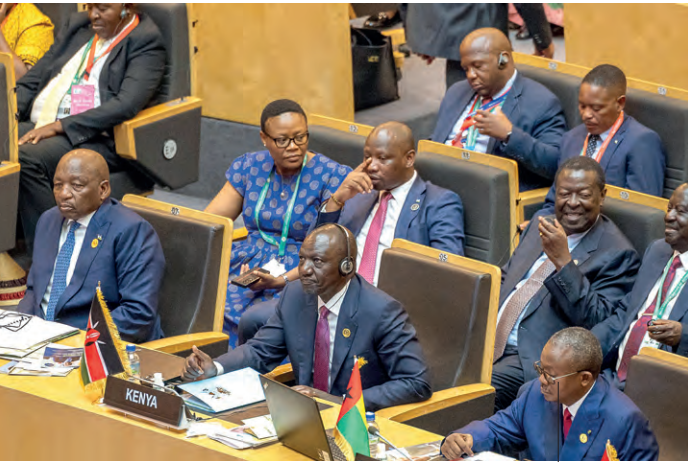
 President William Ruto, his counterpart from Guinea Bissau Umaro Embalo (right) and Lesotho’s PM Sam Matekane during the opening session of the 38th Ordinary Session of the Assembly of the African Union in Addis Ababa, Ethiopia /ELLY OKWARE/PCS
President William Ruto, his counterpart from Guinea Bissau Umaro Embalo (right) and Lesotho’s PM Sam Matekane during the opening session of the 38th Ordinary Session of the Assembly of the African Union in Addis Ababa, Ethiopia /ELLY OKWARE/PCS
In a significant display of geopolitical maneuvering, President Emmanuel Macron of France played a crucial role in the recent African Union Commission elections, ultimately leading to the unexpected defeat of Kenyan politician Raila Odinga.
Macron mobilised support among Francophone African nations, urging them to vote for Djibouti’s candidate instead, according to diplomatic sources Engaging in extensive discussions with various African heads of state, Macron emphasised the importance of strong ties with Djibouti and other French-speaking countries.
France has a lot of interest in Djibouti that host one of its military bases in Africa. His lobbying efforts resulted in a unanimous vote from all Francophone nations in favour of Djibouti’s candidate, dramatically altering the election landscape.
At the same time, Arab States were actively courting Muslim-majority countries, encouraging them to lend their support to Djibouti as well.
This dual strategy significantly enhanced the Djibouti candidate’s standing, with reports suggesting that Arab nations offered financial incentives for development projects in exchange for votes.
Sources close to the situation indicated that the weeks leading up to the election witnessed heightened lobbying activity, with Arab nations establishing a strong presence in Addis Ababa.
Promises of support for the new chair, contingent upon victory, were made to sway undecided nations. Despite entering the race with assurances from about 33 countries, Raila’s support dwindled, and he ultimately received backing from only 22 nations, leading to his loss in the seventh round of voting.
This surprising outcome raises questions about Kenya’s future in uence within the AUC and the broader geopolitical dynamics in Africa.
Raila’s loss is likely to trigger domestic political realignments as the clocks ticks towards the 2027 polls. Raila, a seasoned politician, on Saturday lost to Djibouti’s candidate Ali Youssouf in a tight election that left Raila’s key political bases dejected.
The unexpected loss also shook President William Ruto and his inner circle who had hoped to capitalise on Raila’s victory to catapult his own re-election bid.
In Addis Ababa on Saturday, Ruto’s team was visibly shaken. At a press conference with Raila, Prime Cabinet Secretary Musalia Mudavadi urged Raila not to take questions from journalists.
“The loss shall be felt most by President William Ruto. It is a bad sign for things to come in the future,” former Law Society Of Kenya President Nelson Havi remarked.
Ruto has largely lost the Mt Kenya vote block and his surest route to power after 2027 would be to take over Raila’s political bases.
Some analyst however say Raila’s loss is a double-edged sword that could help Ruto consolidate power but also warn that the former PM could team up with his opposition colleagues in a bid to make Ruto a one-term President.
The loss comes at a time when there is already tension between Raila and Ruto teams in Parliament. This follows the decision by National Assembly Speaker Moses Wetang’ula’s decision to trash a court judgment that declared Azimio the majority party in Parliament.
Azimio has threatened to impeach Wetang’ula, a Kenya Kwanza principal, in a move that could heighten political tension. Chants of “Ruto must go” rented the air in parts of Kisumu, a region that had embraced Ruto after his deal with Raila.
But Homa Bay Town MP Peter Kaluma says ODM must now formalise their engagements with the government.
“We can no longer prevaricate on our relationship with President Ruto. Lack of communication and clear message to our supporters engenders confusion, weakens us and is harmful to our course,” he said.
“We must move forth with courage, formalise our relationship with President Ruto, consolidate our bases and rally our troops to march together towards 2027. We must take charge of our political destiny or be part of the menu of our determined enemies preaching our exclusion from Kenya’s body politic.”
Despite most high-profile political leaders backing Raila for the AU top job, the continental election heightened Kenya’s ethnic politics.
Raila’s loss for instance was celebrated in parts of Mt Kenya, a region now firmly backing former Deputy President Rigathi Gachagua. Gachagua had, however, publicly endorsed Raila for the job.
“Nyeri residents celebrating Raila loss at AU is the lowest they can go in their unexplained hate on him. Baba will punish you by supporting Ruto re-election! What kind of hatred is that surely?” Saboti MP Caleb Amisi remarked.
ODM insiders have asked Raila to return and take charge of the party.
“He is going to actively take part in local politics. I see him calling for an ODM meeting soon during which he will immediately take over as the party’s leader and enter the political field,” Barrack Muluka, a political analyst said on Saturday.
Given that the AUC chair serves for a four-year term, which is renewable once, Raila would have automatically been out of the equation in the 2027 election if he had won.
“I am not going to be very active in Kenyan politics henceforth as I continue now to focus on the continental campaign. But it is a transitional phase from active Kenyan politics to continental politics,” Raila said.
Already, talks of Raila’s succession, could he have won the seat, had dominated the scene with key politicians angling to fill his big political shoes.
Ruto, Raila’s newfound friend, championed his candidature and went at out to ensure he won but that failed to materialise.
In Addis, Raila won the first two
rounds of voting but then went
on to lose the next three rounds to
Djibouti candidate Mahamoud Ali
Youssouf.








